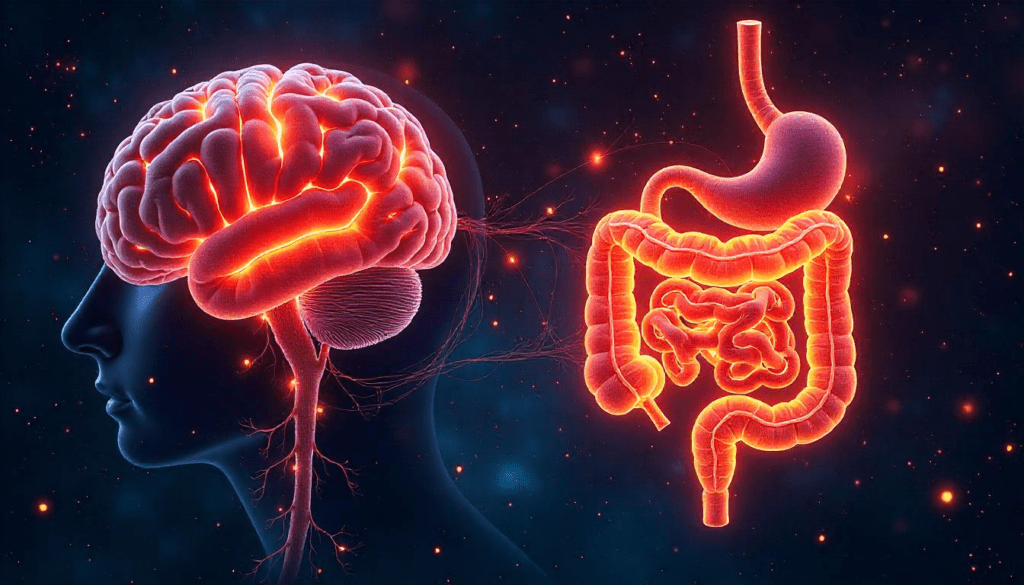I still remember the first time my heart raced not from excitement, but from a deep, unsettling unease that started in my gut. I was in a packed conference hall, about to address hundreds of people, when my stomach twisted into knots so intense that it felt as though someone was wringing it like a towel. My hands trembled, my thoughts scattered, and I suddenly realized this was more than “stage fright”—it was my gut talking to me in the most literal sense.
That moment kicked off my deep dive into the powerful link between gut health and anxiety. What I discovered changed everything: your gut and your mind are more connected than you think. In this guide, I’ll show you how simple shifts in your diet and lifestyle can bring lasting calm. Ready to reclaim your peace from the inside out? Let’s get started—your gut will thank you.
Table of Contents
1. Understanding the Gut–Brain Axis: A Two-Way Street

The term gut–brain axis may sound like complex biomedical jargon, but at its core, it simply describes a continuous dialogue between your digestive system and your brain. Imagine a superhighway of chemical and electrical signals, transporting information about your physical environment, emotional state, and nutritional intake back and forth in real time.
- Enteric Nervous System (ENS): Often called the “second brain,” the ENS consists of over 500 million neurons lining the gastrointestinal tract.
- Vagus Nerve: The primary communication channel linking the gut to the central nervous system, conveying signals about hunger, stress, and emotional valence.
- Neurotransmitters: Your gut microbiota actually produces key mood-regulating chemicals such as serotonin, GABA, and dopamine.
- Immune Mediators: Gut bacteria influence systemic inflammation via the release of cytokines and short-chain fatty acids.
When everything runs smoothly, you experience mental clarity, emotional balance, and robust physical health. However, when the gut–brain communication falters—which can happen through diet, stress, or medication—the result can be chronic anxiety, mood swings, and digestive discomfort.
2. The Microbiome’s Role in Mood Regulation
Your gut is home to trillions of microorganisms—bacteria, fungi, and viruses—collectively known as the microbiome. Far from being passive residents, these tiny allies actively participate in countless body processes.
- Neurotransmitter Production: Approximately 90% of your body’s serotonin is made in the gut, not the brain. Certain bacteria convert dietary components into GABA, an inhibitory neurotransmitter that calms neural circuits.
- Short-Chain Fatty Acids (SCFAs): Fermentation of dietary fiber by gut bacteria produces SCFAs like butyrate, propionate, and acetate, which reduce inflammation and strengthen the gut barrier.
- Immune Modulation: A balanced microbiome trains your immune system to distinguish friend from foe, lowering chronic inflammatory signaling that can provoke anxiety.
When the microbiome is disrupted—a state called dysbiosis—we see increased intestinal permeability (“leaky gut”), systemic inflammation, and overstimulation of the hypothalamic–pituitary–adrenal (HPA) axis, all of which can amplify anxiety.
3. Signs Your Gut and Anxiety Are Linked

Recognizing that your gut may be fueling your anxiety is the first step toward change. Here are common red flags:
- Frequent Digestive Upsets: Bloating, gas, diarrhea, or constipation that spike during anxious moments.
- Unexplained Fatigue: Feeling drained after minor stressors, often paired with sluggish digestion.
- Mood Swings: Rapid emotional shifts coinciding with mealtimes or changes in diet.
- Brain Fog: Difficulty concentrating when your gut feels unsettled.
- Sleep Disruption: Insomnia or poor sleep quality following late-night snacking or alcohol.
By journaling both your diet and your emotional state, you can start to connect the dots between what you eat and how you feel.
4. Research Highlights: Evidence from Science
Animal Studies Offer Insight
- Germ-free rodents exhibit exaggerated stress responses—introducing normal gut bacteria often reverses this effect.
- Specific strains like Lactobacillus rhamnosus have been shown to modulate GABA receptor expression in the brain.
Human Clinical Trials
- A randomized, placebo-controlled trial showed that daily Bifidobacterium longum supplementation reduced anxiety scores by over 20% in just four weeks.
- Meta-analyses reveal that multispecies probiotic formulas yield significant reductions in perceived stress and anxiety symptoms.
Emerging Fields: Psychobiotics and FMT
- Psychobiotics are live organisms that, when ingested in adequate amounts, confer mental health benefits.
- Preliminary fecal microbiota transplant (FMT) trials indicate potential for re-establishing healthy microbiomes in severe mood disorders.
This growing body of evidence confirms what many of us have felt: a thriving gut microbiome is central to mental wellness.
5. Food Strategies to Soothe Anxiety

Incorporate these daily:
- Kefir: A tangy, drinkable yogurt packed with diverse probiotic strains.
- Sauerkraut & Kimchi: Fermented cabbage that delivers live cultures plus vitamins.
- Miso & Tempeh: Soy-based ferments rich in Lactobacillus and Bifidobacterium.
Tip: Start with small servings (1–2 tablespoons) to allow your system to adapt.
Foods that feed beneficial bacteria include:
- Garlic & Onions: High in inulin, a powerful prebiotic fiber.
- Leeks & Asparagus: Add diversity to your microbiome-friendly plate.
- Bananas & Oats: Gentle sources of resistant starch, supporting SCFA production.
Aim for at least 25–30 grams of fiber daily from a variety of sources.
Incorporate Anti-Inflammatory Nutrients
- Omega-3 Fatty Acids: From wild-caught salmon, chia seeds, or flax—reduces inflammatory markers.
- Polyphenol-Rich Foods: Berries, green tea, turmeric—support gut barrier integrity.
Minimize foods that can aggravate the microbiome:
| Foods to Limit | Why to Limit |
|---|---|
| Ultra-processed snacks | High in sugars and industrial oils |
| Artificial sweeteners | May disturb microbial balance |
| Excess alcohol | Increases gut permeability |
| High-dose antibiotics (unless prescribed) | Wipes out beneficial bacteria |
6. Probiotics and Probiotic Supplements
While food sources are ideal, targeted supplements can be helpful:
- Choose Evidence-Based Strains: L. rhamnosus, B. longum, L. helveticus.
- CFU Count: Look for products with at least 10–20 billion CFUs per dose.
- Quality Matters: Ensure third-party testing, temperature-stable delivery, and clear strain labeling.
Personal Note: I trialed several brands before finding one that combined L. rhamnoses with B. longum, and within two weeks, I noticed fewer anxious thoughts before meetings.
7. Prebiotics, Fiber, and Functional Foods
Beyond probiotics, prebiotics and functional foods play key roles:
- Inulin & FOS Supplements: Powdered fibers that mix easily into smoothies.
- Resistant Starch: Cooked-and-cooled potatoes or rice boost butyrate production.
- Collagen & Bone Broth: Provides amino acids supporting gut lining repair.
Incorporating both prebiotics and probiotics—a “synbiotic” approach—maximizes the chance of establishing a calm, diverse microbiome.
8. Lifestyle Habits that Support Gut Health

- Daily Meditation or Breathwork: Even five minutes can downregulate the HPA axis.
- Gratitude Journaling: Reduces cortisol and promotes a positive mindset.
Quality Sleep
- Aim for 7–9 Hours: Consistent bedtimes align circadian rhythms and microbial cycles.
- Limit Blue Light: Screens before bed can disrupt melatonin and gut motility.
Regular Movement
- Gentle Cardio: Walks, cycling, or swimming enhance gut motility and microbial diversity.
- Mindful Yoga: Combines stress reduction with light physical activity.
Responsible Antibiotic Use
Treat antibiotics as a last resort; when needed, follow with targeted probiotic therapy and a gut-healing diet.
9. Personalized Gut–Calm Action Plan: 8 Weeks to Less Anxiety
Use the following structured blueprint to integrate food, supplements, and lifestyle:
| Week | Focus | Action Steps |
| 1–2 | Fermented Foods Introduction | Start with 1 tbsp of sauerkraut or kefir daily; observe changes in digestion and mood. |
| 3–4 | Prebiotic Boost | Add garlic, onions, bananas, or inulin powder; target 5–10g of prebiotics daily. |
| 5–6 | Probiotic Supplementation | Begin a vetted probiotic with L. rhamnosus + B. longum; take as directed for 4 weeks. |
| 7–8 | Lifestyle Integration & Review | Incorporate meditation, consistent sleep, and daily walks; journal improvements and setbacks. |
Tracking Tips:
- Maintain a Gut–Mood Journal: Record meals, anxiety levels (1–10), sleep quality, and exercise.
- Use simple apps or a notebook—consistency is key.
10. Potential Challenges and Pitfalls
While transforming your gut to ease anxiety can be powerful, it’s not without its hurdles. Being prepared for the roadblocks can make your journey smoother and less frustrating.
1. Initial Digestive Discomfort
Adding fermented foods or high-fiber prebiotics can trigger bloating, gas, or cramping—especially if your microbiome has been undernourished. This doesn’t mean you’re doing it wrong. In fact, it’s often a sign of microbial change.
👉 Tip: Begin with small portions (1 tbsp of sauerkraut, ½ banana) and build up gradually over 2–3 weeks.
2. Inconsistent or Delayed Results
Some people feel relief in days; for others, it can take weeks or months. The gut ecosystem is complex, and restoring balance takes time.
👉 Tip: Track progress in a gut–mood journal to spot subtle changes in digestion, sleep, and mood.
3. Not All Probiotics Work the Same
Your body is unique, and different strains affect people differently. What calms one person’s anxiety might not affect another.
👉 Tip: Rotate probiotics every 6–8 weeks or choose blends with multiple strains. Trial and error is part of the process.
4. Falling for Marketing Hype
Some supplements boast exaggerated claims without scientific backing. Others may lack enough live organisms to be effective.
👉 Tip: Stick with clinically researched strains like Lactobacillus rhamnosus or Bifidobacterium longum. Look for third-party testing.
5. Overemphasis on Supplements
Relying solely on pills while ignoring food or lifestyle factors often limits success.
👉 Tip: Prioritize whole foods, stress management, and sleep. Supplements should enhance—not replace—these habits.
6. Emotional Triggers Can Derail Progress
Even a thriving gut can be thrown off by trauma, unresolved stress, or chronic emotional strain.
👉 Tip: Consider therapy, mindfulness, or journaling as companions to your gut-healing plan.
7. Hidden Gut Imbalances
Conditions like SIBO (small intestinal bacterial overgrowth) or Candida overgrowth can block progress despite good habits.
👉 Tip: If symptoms persist despite clean eating and probiotics, consult a functional medicine practitioner or gastroenterologist.
Being aware of these challenges helps you stay committed, resilient, and adaptable on your journey to a calmer gut and mind.
11. When to Seek Professional Help
If anxiety persists despite gut-focused interventions, consider:
- Therapy or Counseling: Cognitive-behavioral therapy (CBT) effectively addresses anxiety patterns.
- Medical Evaluation: Rule out underlying gut conditions like IBS, SIBO, or food sensitivities.
- Medication Consultation: SSRIs or other anxiolytics may be necessary for moderate to severe cases.
Integrative care—combining conventional treatment with gut health strategies—often yields the best outcomes.
12. The Future of Psych biotics and Personalized Nutrition
We stand at the dawn of a new era in mental health: psychobiotics and precision microbiome therapies. Researchers are exploring:
- Next-Generation Probiotics: Engineered strains that produce specific neurotransmitters.
- Microbiome Sequencing: Personalized supplement recommendations based on your unique gut profile.
- Targeted FMT: Tailored fecal transfers designed to correct severe dysbiosis linked to anxiety.
In the years ahead, a simple stool test might guide your diet, supplement regimen, and even behavioral prescriptions to maintain both gut and mind wellness.
Conclusion: Empowered Healing
Our journey together—through the science, the personal stories, and the actionable steps—underscores one overarching truth: your gut holds the key to unlocking calmer, more resilient mental health. By nurturing the microbiome with the right foods, supplements, and lifestyle choices, you cultivate a foundation for lasting anxiety relief.
Remember:
- Consistency: Small, daily habits yield the greatest transformation.
- Curiosity: Stay open to experimenting and learning what your body needs.
- Compassion: Approach yourself gently; change takes time.
I hope this guide empowers you to listen to your gut—literally—and reclaim peace from within. If you’ve found value in these insights, please share your experiences in the comments below. Your story could be the spark that lights the path for someone else.
Wishing you serenity, strength, and gut-informed calm.
Frequently Asked Questions (FAQs)
Q1: How quickly can gut health changes affect anxiety?
A: While some people notice mood improvements in as little as 2–4 weeks, most see significant change within 6–8 weeks when consistently following dietary and lifestyle adjustments.
Q2: Which probiotic strains are best for reducing anxiety?
A: Clinically researched strains like Lactobacillus rhamnosus, Bifidobacterium longum, and Lactobacillus helveticus have shown the most promise in lowering anxiety symptoms.
Q3: Can fermented foods replace probiotic supplements?
A: Fermented foods are an excellent natural source of probiotics, but supplements can provide higher, targeted CFUs and specific strains that might be harder to get from food alone.
Q4: Are there any risks to taking prebiotics or probiotics?
A: Initial bloating or gas is common when starting prebiotics. Probiotics are generally safe for healthy individuals, but those with immune issues should consult a healthcare provider.
Q5: Will reducing sugar improve my gut and anxiety?
A: Yes! Cutting down on excess sugar limits harmful bacteria overgrowth, reduces inflammation, and supports a balanced microbiome—key factors in anxiety relief.
Q6: How does stress impact my gut health?
A: Chronic stress releases cortisol, which can disrupt gut motility and barrier function, leading to dysbiosis and worsening anxiety symptoms.
Q7: Can antibiotics trigger anxiety by harming gut bacteria?
A: Antibiotics can indiscriminately kill beneficial microbes, potentially causing dysbiosis. Pair antibiotic courses with probiotics and a healing diet to mitigate effects.
Q8: Are there specific herbs or teas that support gut and anxiety relief?
A: Yes! Chamomile, peppermint, and ginger tea can soothe the digestive tract and reduce anxiety by calming the nervous system.
Q9: What role does sleep play in gut–anxiety balance?
A: Poor sleep disrupts circadian rhythms and microbial cycles, leading to increased inflammation and anxiety. Aim for 7–9 hours of quality sleep nightly.
Q10: Is intermittent fasting good or bad for gut and anxiety?
A: When done mindfully, intermittent fasting can promote microbial diversity and autophagy. However, extreme fasting can stress the body and worsen anxiety—start slow and listen to your body.—
